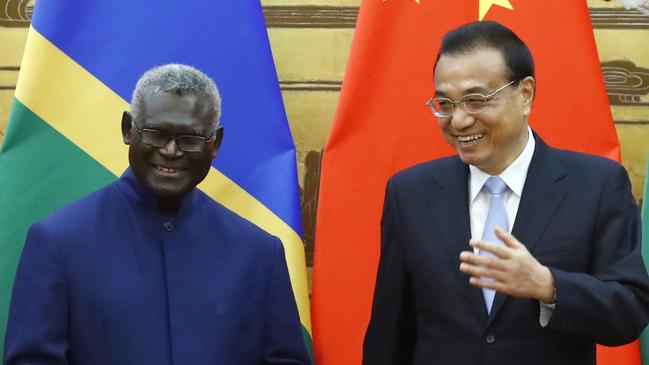Solomons outcry exposes ‘colonial mentality’: China
China has denounced Australia and New Zealand for their “colonial mentality” in Beijing’s most detailed defence of its security agreement with the Solomon Islands.

China has denounced Australia and New Zealand for their “colonial mentality” in Beijing’s most detailed defence of its security agreement with the Solomon Islands.
A spokesman at China’s embassy in the Solomons said concerns the pact could allow a People’s Liberation Army base to be established were “utterly misinformation deliberately spread with political motive”.
The spokesman dismissed worries in Canberra, Wellington and among fellow Pacific Island countries that the agreement could lead to the militarisation of the region.
“The world has entered into [the] 21st century, but regrettably some people are still indulged in Cold War and colonial mentality,” the spokesman said. “Some people claim that Pacific Island countries are their own ‘backyard’, hype ‘China military threat’, [and] try to create tensions and confrontation in the region.”
The security pact was revealed by New Zealand academic Anna Powles a fortnight ago, triggering widespread alarm across the region and beyond.
Solomon Islands Prime Minister Manasseh Sogavare last week said the reaction was “insulting” in a fiery speech to parliament delivered shortly before signing the agreement.
A Solomon Islands government spokesman later acknowledged the “security ramifications” of hosting a Chinese military base and said Mr Sogavare’s government would “not be careless to allow such initiative to take place under its watch”.
In the new scripted question-and-answer sheet, China’s embassy in the Solomons gave its most lengthy response to the controversy. The spokesman cited “bitter memories” about Solomon Islands riots in November 2021 as the reason for the agreement, which would allow Chinese military forces to be deployed in the Pacific Island nation.
“The national development and international image of Solomon Islands were hit hard by riots, and business facilities including Chinatown heavily destroyed. The tragedy should not repeat itself in the future.”
Mr Sogavare’s government severed diplomatic ties with Taiwan in 2019, establishing ties with China.
China has made the Pacific Island country one of its investment priorities within the region.
The spokesman said China, the world’s “largest developing country”, respected the sovereignty of the Solomons. “Non-interference is the bedrock of China’s foreign policy. China was interfered and bullied by Western powers in history, and therefore can fully understand the value of sovereignty and independence of developing countries.”
Beijing has come under pressure for refusing to condemn Russia’s invasion of Ukraine, despite its “non-interference” policy.
Overnight in Brussels, NATO secretary-general Jens Stoltenberg singled out China’s lean towards Moscow in comments delivered before a meeting of NATO foreign ministers and the alliance’s Indo-Pacific partners, including Australia, Japan, New Zealand and South Korea.
“We see that China has been unwilling to condemn Russia’s aggression, and has joined Moscow in questioning the right of nations to choose their own path,” Mr Stoltenberg said.
He said NATO and its partners needed to “take account of China’s growing influence and coercive policies on the global stage, which pose a systemic challenge to our security, and to our democracies”.
Back in Honiara, the Chinese embassy spokesman denied Beijing was involved in playing a “power game” with Pacific Island countries. “China is committed to peaceful development and has no intention at all to engage in competition or play power games with other countries in Pacific Islands region,” he said.




To join the conversation, please log in. Don't have an account? Register
Join the conversation, you are commenting as Logout